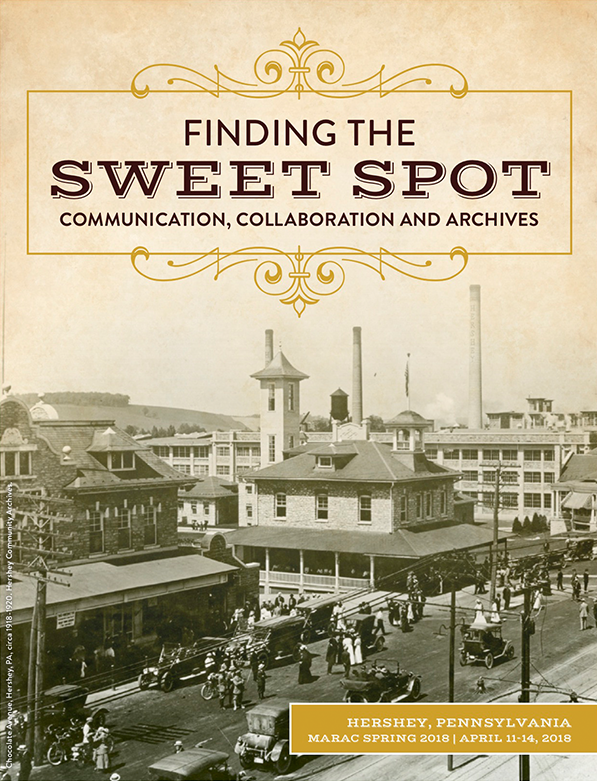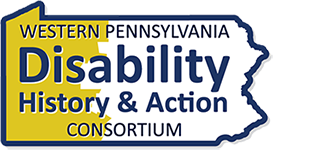 A lively and well-attended session titled Archives and Advocacy: Preserving Pennsylvania’s Disability History was offered at the Mid-Atlantic Regional Archives Conference (MARAC) in April. Sierra Green, archivist at the Heinz History Center’s Detre Library and Archives and Western Pennsylvania Disability History and Action Consortium steering committee member, went to the 90-minute session about the Pennsylvania State Archives’ collaboration with statewide organizations to preserve the history of institutionalization and the experiences of people with intellectual disabilities in the state.
A lively and well-attended session titled Archives and Advocacy: Preserving Pennsylvania’s Disability History was offered at the Mid-Atlantic Regional Archives Conference (MARAC) in April. Sierra Green, archivist at the Heinz History Center’s Detre Library and Archives and Western Pennsylvania Disability History and Action Consortium steering committee member, went to the 90-minute session about the Pennsylvania State Archives’ collaboration with statewide organizations to preserve the history of institutionalization and the experiences of people with intellectual disabilities in the state.
Tyler Stump: State archives have added 500 linear feet of records
Tyler Stump, an archivist with the Pennsylvania State Archives, said that as institutions close and the people who lived in state-run institutions age, it is crucial that the records and the stories of those who lived there are captured and preserved. The historical record of the limitations of the institutions and the abuses that took place are crucial to counter modern-day suggestions to reopen such institutions. Stump shared that over the past two years Pennsylvania State Archives staff have conducted nine major collection inventories at state-run institutions. Additionally, they have acquired records from 13 different institutions that amount to 500 linear feet added to the State Archives. Stump concluded by underscoring the importance of close partnerships with other organizations across Pennsylvania in order to preserve the fullest story possible.
Margery Sly: It’s critical to preserve the papers and the voices of activists
Margery Sly, Director of the Special Collections Research Center at Temple University, talked about her collaboration with the Institute on Disabilities at Temple University. Sly has worked with the Institute to pursue and preserve the personal collections of important activists such as Dennis Haggerty and Leona Fialkowski. Sly also explained that at times, the papers of activists do not richly reflect the important advocacy work they undertook throughout their lives. Further collaboration with the Institute on Disabilities resulted in the preservation of interviews for the Visionary Voices project. These interviews helped fill in gaps that existed within the archival collections. Sly further reflected on how collaboration within the disability community has resulted in the thoughtful and respectful modernization of terminology that Temple University’s Special Collections Research Center now uses to describe the collections within their holdings pertaining to people with disabilities. She noted that the official subject terms of the Library of Congress are sometimes outdated and harmful. As a result, the Special Collections Research Center is now working to finalize a Statement on Potentially Harmful Language in Archival Description and Cataloguing.
Elliott Simon: Elwyn’s records serve as a resource for researchers
Elliott Simon, Executive Director of Research and Health Services at Elwyn, spoke about the history of Elwyn and the opportunities for research drawn from the records preserved there. Founded in 1852, Elwyn began as a private institution in Philadelphia to care for and educate children with intellectual and other disabilities. Today it offers a range of services to children and adults with intellectual, physical, behavioral and developmental disabilities. Simon, a psychologist who has worked at Elwyn for many years, worked with Consortium member Dana Olsen, as well as West Chester University and Millersville University faculty members and students in order to preserve Elwyn’s history. As a result of their efforts, steps have been taken to preserve Elwyn’s collection and the group has been able to establish a small onsite museum. An academic paper drawn from the institution’s records was recently published in The Journal of the Gilded Age and Progressive Era. Additionally, two dissertations include research drawn from Elwyn’s archives.
J. Gregory Pirmann: It’s important not to forget the story of Pennhurst
J. Gregory Pirmann worked at the Pennhurst State School and Hospital before its 1987 closing and is now senior vice president of the Pennhurst Memorial & Preservation Alliance. Founded in 2008, the Pennhurst Memorial & Preservation Alliance uses the history of this one institution to illustrate the larger human and civil rights struggle of people with disabilities. Pirmann described the Alliance’s dedication to the preservation of the records of Pennhurst State School and Hospital and expressed concern over the past loss of records. Additionally, Pirmann also shared information about the publication of Images of America: Pennhurst State School and Hospital as part of the Alliance’s efforts to share the story of the people who lived at Pennhurst.
Lisa Sonneborn: Art offers another way to engage with history
Lisa Sonneborn, Director of Media Arts and Culture at the Institute on Disabilities at Temple University, shared how the Institute uses art in different forms to help people engage with disability history. For example, the performance A Fierce Kind of Love is described as “a collage of stories—large and intimate—of Pennsylvania’s Intellectual Disability Rights Movement,” and includes performers with and without disabilities. Audience surveys showed that more than 60 percent did not self-identify as having a personal connection with a person with disabilities. The Institute’s current project has involved sending a team of artists to help residents at the Selinsgrove Center express and share their voices through art. In both projects, art is used to build connections between people.


